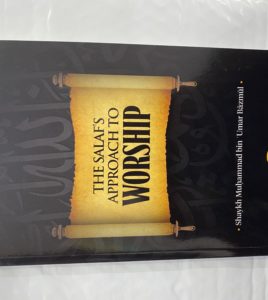Home Page > Articles > Establishing The Obligation of Unity Through Establishing The Obligation of Prayer
Establishing The Obligation of Unity Through Establishing The Obligation of Prayer
By al-‘Allammah al-Imām Muhammad bin Saalih al-‘Uthaymeen (رحمه الله) [d.1421H/2001]
Translation by Abū Mu’ādh Taqwīm Aslam ©2015 Hikmah Publications, Philadelphia PA, USA
The scholars are agreed that congregational prayer is from the most noble, emphasized, and best of worship. Allah, the Most High alluded to it in the Qur’an, and commanded it even in times of fear, so He said:
“When you (Oh Messenger Muhammad) are among them, and lead them in As-Salāh (the prayer), let one party of them stand [in Salāh (prayer)] with you taking their arms with them; when they finish their prostrations, let them take their positions in the rear and let the other party come up which have not yet prayed, and let them pray with you taking all the precautions and bearing arms. {Surah an-Nisā 4:102}
And in the Sunnah of the Messenger of Allāh (صلى الله عليه و سلم) there are many Ahadīth (prophetic narrations) indicating the obligation of the congregational prayer, for example:
1 — His (صلى الله عليه و سلم) statement, “By Him, in Whose Hand my soul is, I intended or planned or was about to order for firewood (as fuel) to be collected, and then order someone to make the adhān (the call to prayer), and then order someone to lead the prayer, then I would go behind and burn the houses of men who did not present themselves for the congregational prayer. By Him, in Whose Hand my soul is, if anyone of them had known that he would get a bone covered with good meat or two small pieces of meat present in between two ribs, he would have turned up for the ‘Ishā prayer.” [Sahīh al-Bukharī #644/Sahīh Muslim #651]
2 — His (صلى الله عليه و سلم) statement, “Whoever hears the call (adhān) and does not attend (the congregational prayer), then there is no prayer for him, except if there is an (acceptable) reason.” [Sunan Abū Dāwūd #551/Sunan Ibn Mājah #793]
3 — His (صلى الله عليه و سلم) statement to the blind man who requested from him permission to pray at home, “Do you hear the adhān for prayer?” He said, “Yes”. He (صلى الله عليه و سلم) said, ” Respond to it (i.e. go to the masjid in that case).” [Sahīh Muslim #653]
Ibn Mas’ud said, “I saw us, and none would stay behind from it – i.e. congregational prayer – except a hypocrite known for his hypocrisy, and a man would be brought leaning between (the shoulders) of two men until he is (helped) to stand in the row.” [Sahīh Muslim #654]
The correct understanding indicates its obligation, for indeed the Islamic Ummah is one Ummah, and the perfection of unity is not realized except that the Ummah unites together in its worship. And the most noble, best and emphasized of worship is the prayer. Hence, from the obligations upon the Ummah of Islam is to unite upon this prayer.
The scholars differed after having agreed that it is the most emphasized, and most noble (of the acts) of worship — Is it (congregational prayer) a condition for the correctness (acceptance) of the prayer? Or is the prayer correct without it but with sin, and other oppositions?
What is correct is that it is obligatory for the prayer, and not a condition for the correctness (validity) of the prayer, but whoever leaves it is a sinner, except if he has a legislative reason. The evidence that it is not a condition for the validity and correctness of the prayer is that the Messenger (صلى الله عليه و سلم) gave precedence to the congregational prayer over the individual prayer, and giving this precedence indicates that the individual prayer does have some virtue, and that cannot be unless the individual prayer was correct and valid.
In any case, it is obligatory upon every male adult Muslim to attend the congregational prayer, whether that is in travelling or whilst resident…. for more rulings pertaining to the prayer read “The Prophet’s Prayer Described” by Shaikh Muhammad bin Saalih al-‘Uthaymeen.
Trackbacks and pingbacks
No trackback or pingback available for this article.
 (267) 428-1723
(267) 428-1723








Leave a Reply